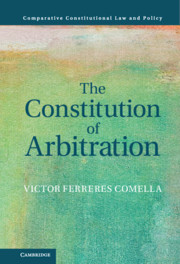Introduction
The Varieties of Arbitration
Published online by Cambridge University Press: 11 March 2021
Summary
This book studies arbitration from a constitutional perspective. Its scope is broad, for it explores the most important modalities of arbitration. Part One focuses on arbitration in private law. Any constitutional inquiry into arbitration must begin at the national level. We need to discuss whether Constitutions should protect the right to arbitration, and what kinds of justifications the state may advance in defence of the restrictions it places on the arbitral process. Part Two centers on investor-state arbitration, which has generated much controversy in recent years. Critics contend that this form of arbitration privileges foreign investors in unacceptable ways. Local investors are discriminated against and the ability of governments to regulate matters in the public interest is unduly curtailed, critics argue. Part Three looks at state-to-state arbitration, which has historically played a key part in the evolution of international law. The establishment of international courts in the twentieth century did not help transcend the arbitral foundations of adjudication, however. The jurisdiction of international courts always stems from the consent of the parties. This limitation should raise concerns from a constitutional point of view.
Keywords
- Type
- Chapter
- Information
- The Constitution of Arbitration , pp. 1 - 6Publisher: Cambridge University PressPrint publication year: 2021

